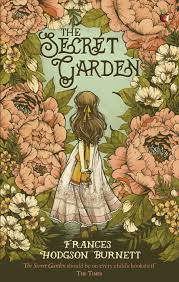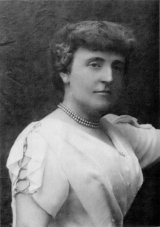The Secret Garden Page #10
The Secret Garden is a novel by Frances Hodgson Burnett first published in book form in 1911, after serialization in The American Magazine. Set in England, it is one of Burnett's most popular novels and seen as a classic of English children's literature. Several stage and film adaptations have been made.
“It tastes nice today,” said Mary, feeling a little surprised herself. “It’s th’ air of th’ moor that’s givin’ thee stomach for tha’ victuals,” answered Martha. “It’s lucky for thee that tha’s got victuals as well as appetite. There’s been twelve in our cottage as had th’ stomach an’ nothin’ to put in it. You go on playin’ you out o’ doors every day an’ you’ll get some flesh on your bones an’ you won’t be so yeller.” “I don’t play,” said Mary. “I have nothing to play with.” “Nothin’ to play with!” exclaimed Martha. “Our children plays with sticks and stones. They just runs about an’ shouts an’ looks at things.” Mary did not shout, but she looked at things. There was nothing else to do. She walked round and round the gardens and wandered about the paths in the park. Sometimes she looked for Ben Weatherstaff, but though several times she saw him at work he was too busy to look at her or was too surly. Once when she was walking toward him he picked up his spade and turned away as if he did it on purpose. One place she went to oftener than to any other. It was the long walk outside the gardens with the walls round them. There were bare flower-beds on either side of it and against the walls ivy grew thickly. There was one part of the wall where the creeping dark green leaves were more bushy than elsewhere. It seemed as if for a long time that part had been neglected. The rest of it had been clipped and made to look neat, but at this lower end of the walk it had not been trimmed at all. A few days after she had talked to Ben Weatherstaff, Mary stopped to notice this and wondered why it was so. She had just paused and was looking up at a long spray of ivy swinging in the wind when she saw a gleam of scarlet and heard a brilliant chirp, and there, on the top of the wall, perched Ben Weatherstaff’s robin redbreast, tilting forward to look at her with his small head on one side. “Oh!” she cried out, “is it you—is it you?” And it did not seem at all queer to her that she spoke to him as if she were sure that he would understand and answer her. He did answer. He twittered and chirped and hopped along the wall as if he were telling her all sorts of things. It seemed to Mistress Mary as if she understood him, too, though he was not speaking in words. It was as if he said: “Good morning! Isn’t the wind nice? Isn’t the sun nice? Isn’t everything nice? Let us both chirp and hop and twitter. Come on! Come on!” Mary began to laugh, and as he hopped and took little flights along the wall she ran after him. Poor little thin, sallow, ugly Mary—she actually looked almost pretty for a moment. “I like you! I like you!” she cried out, pattering down the walk; and she chirped and tried to whistle, which last she did not know how to do in the least. But the robin seemed to be quite satisfied and chirped and whistled back at her. At last he spread his wings and made a darting flight to the top of a tree, where he perched and sang loudly. That reminded Mary of the first time she had seen him. He had been swinging on a tree-top then and she had been standing in the orchard. Now she was on the other side of the orchard and standing in the path outside a wall—much lower down—and there was the same tree inside. “It’s in the garden no one can go into,” she said to herself. “It’s the garden without a door. He lives in there. How I wish I could see what it is like!” She ran up the walk to the green door she had entered the first morning. Then she ran down the path through the other door and then into the orchard, and when she stood and looked up there was the tree on the other side of the wall, and there was the robin just finishing his song and beginning to preen his feathers with his beak. “It is the garden,” she said. “I am sure it is.” She walked round and looked closely at that side of the orchard wall, but she only found what she had found before—that there was no door in it. Then she ran through the kitchen-gardens again and out into the walk outside the long ivy-covered wall, and she walked to the end of it and looked at it, but there was no door; and then she walked to the other end, looking again, but there was no door. “It’s very queer,” she said. “Ben Weatherstaff said there was no door and there is no door. But there must have been one ten years ago, because Mr. Craven buried the key.” This gave her so much to think of that she began to be quite interested and feel that she was not sorry that she had come to Misselthwaite Manor. In India she had always felt hot and too languid to care much about anything. The fact was that the fresh wind from the moor had begun to blow the cobwebs out of her young brain and to waken her up a little. She stayed out of doors nearly all day, and when she sat down to her supper at night she felt hungry and drowsy and comfortable. She did not feel cross when Martha chattered away. She felt as if she rather liked to hear her, and at last she thought she would ask her a question. She asked it after she had finished her supper and had sat down on the hearth-rug before the fire. “Why did Mr. Craven hate the garden?” she said. She had made Martha stay with her and Martha had not objected at all. She was very young, and used to a crowded cottage full of brothers and sisters, and she found it dull in the great servants’ hall downstairs where the footman and upper-housemaids made fun of her Yorkshire speech and looked upon her as a common little thing, and sat and whispered among themselves. Martha liked to talk, and the strange child who had lived in India, and been waited upon by “blacks,” was novelty enough to attract her. She sat down on the hearth herself without waiting to be asked. “Art tha’ thinkin’ about that garden yet?” she said. “I knew tha’ would. That was just the way with me when I first heard about it.” “Why did he hate it?” Mary persisted. Martha tucked her feet under her and made herself quite comfortable. “Listen to th’ wind wutherin’ round the house,” she said. “You could bare stand up on the moor if you was out on it tonight.” Mary did not know what “wutherin’” meant until she listened, and then she understood. It must mean that hollow shuddering sort of roar which rushed round and round the house as if the giant no one could see were buffeting it and beating at the walls and windows to try to break in. But one knew he could not get in, and somehow it made one feel very safe and warm inside a room with a red coal fire. “But why did he hate it so?” she asked, after she had listened. She intended to know if Martha did. Then Martha gave up her store of knowledge. “Mind,” she said, “Mrs. Medlock said it’s not to be talked about. There’s lots o’ things in this place that’s not to be talked over. That’s Mr. Craven’s orders. His troubles are none servants’ business, he says. But for th’ garden he wouldn’t be like he is. It was Mrs. Craven’s garden that she had made when first they were married an’ she just loved it, an’ they used to ’tend the flowers themselves. An’ none o’ th’ gardeners was ever let to go in. Him an’ her used to go in an’ shut th’ door an’ stay there hours an’ hours, readin’ and talkin’. An’ she was just a bit of a girl an’ there was an old tree with a branch bent like a seat on it. An’ she made roses grow over it an’ she used to sit there. But one day when she was sittin’ there th’ branch broke an’ she fell on th’ ground an’ was hurt so bad that next day she died. Th’ doctors thought he’d go out o’ his mind an’ die, too. That’s why he hates it. No one’s never gone in since, an’ he won’t let anyone talk about it.”
Translation
Translate and read this book in other languages:
Select another language:
- - Select -
- 简体中文 (Chinese - Simplified)
- 繁體中文 (Chinese - Traditional)
- Español (Spanish)
- Esperanto (Esperanto)
- 日本語 (Japanese)
- Português (Portuguese)
- Deutsch (German)
- العربية (Arabic)
- Français (French)
- Русский (Russian)
- ಕನ್ನಡ (Kannada)
- 한국어 (Korean)
- עברית (Hebrew)
- Gaeilge (Irish)
- Українська (Ukrainian)
- اردو (Urdu)
- Magyar (Hungarian)
- मानक हिन्दी (Hindi)
- Indonesia (Indonesian)
- Italiano (Italian)
- தமிழ் (Tamil)
- Türkçe (Turkish)
- తెలుగు (Telugu)
- ภาษาไทย (Thai)
- Tiếng Việt (Vietnamese)
- Čeština (Czech)
- Polski (Polish)
- Bahasa Indonesia (Indonesian)
- Românește (Romanian)
- Nederlands (Dutch)
- Ελληνικά (Greek)
- Latinum (Latin)
- Svenska (Swedish)
- Dansk (Danish)
- Suomi (Finnish)
- فارسی (Persian)
- ייִדיש (Yiddish)
- հայերեն (Armenian)
- Norsk (Norwegian)
- English (English)
Citation
Use the citation below to add this book to your bibliography:
Style:MLAChicagoAPA
"The Secret Garden Books." Literature.com. STANDS4 LLC, 2024. Web. 25 Nov. 2024. <https://www.literature.com/book/the_secret_garden_427>.




Discuss this The Secret Garden book with the community:
Report Comment
We're doing our best to make sure our content is useful, accurate and safe.
If by any chance you spot an inappropriate comment while navigating through our website please use this form to let us know, and we'll take care of it shortly.
Attachment
You need to be logged in to favorite.
Log In